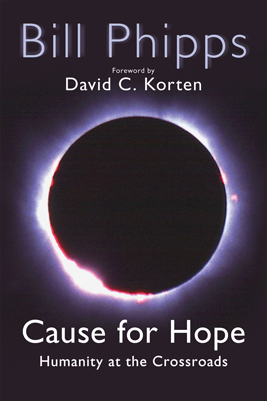
Dispatches from the Global Village is a collection of 30 columns by Derek Evans, former Deputy Secretary General of Amnesty International. While the entry point for these columns (first published by the Naramata and Penticton, B.C., newspapers) is often something seemingly innocuous, perhaps even mundane - like a cup of tea, a croissant, a picture on a wall - the essays themselves are not for the faint of heart.
As the leader of more than 60 Amnesty International delegations, and more recently as a consultant to the United Nations and other international organizations, Evans has travelled the globe to meet with African warlords and the Dalai Lama, heads of state and the leaders of rebel armies, victims of torture and peasant farmers; his single-minded objective, to challenge the forces of injustice, violence, and all things that separate people and nations from each other.
Yet, what shines through in each story - whether he's negotiating with rebel factions in the Sudan; or meeting, under threat of death and in the dead of night, with the families of "disappeared" children in Sri Lanka - is Evans' unfaltering hope that people can find within themselves the wisdom to choose a different path, that somehow we can learn to live in peace despite our differences.
Informing, challenging, and inspiring, the stories, images, and hope contained in Dispatches from the Global Village will stay with the reader long after the book is set down.
Derek Evans, Author

Derek Evans is a writer, teacher, scholar, and activist. His work in peace and human rights spans three decades and five continents. Evans has served two terms as Deputy Secretary General of Amnesty International, and has led more than seventy international delegations conducting human rights investigations or peace negotiations. He was awarded the McGeachy Senior Scholarship for 2005-2006 in recognition of his inter-disciplinary work in the field of reconciliation in post-conflict situations. He teaches at Simon Fraser University and is a core faculty member in the Morris J. Wosk Centre for Dialogue's diploma program. In May 2010, Derek recieved an honorary Doctorate from the Vancouver School of Theology, which is connected to the University of British Columbia. The citation recognizes his work in human rights and inter-faith dialogue.
Previous titles published by Wood Lake Publishing include The Light and the Burning (1982), Before the War (2004) and Dispatches from the Global Village (2008).
Media Reviews
author of After the Beginning and Seasons of Peace
Carolyn PogueAn invitation to sit for a while with stories from a great peacemaker. If you accept this invitation, prepare to be informed, shocked, and inspired. This powerful book will change how you image the world is, and how the world can be.
former Secretary General, Amnesty International Canada
Roger ClarkThere are few people able to match Derek's knowledge of the world.
Department of Theological Studies, Loyola Marymount University, Los Angeles
Professor Amir HussainIn his human rights work, Derek has seen real suffering. For Derek, a bad day is when prisoners of conscience are executed, or people are tortured. Yet he is able to remain hopeful, and help us all work towards reconciliation and justice. He reminds us of the power that each of us have to make a difference with our lives. Derek Evans is an "ambassador of hope and commitment," who illuminates the connections that bind us all together as people.
The first time I visited Cambodia was after the country had been devastated by decades of horror – years of secret bombing by the United States, the terror of the mass murders by the Khmer Rouge, and finally, invasion and occupation by the Vietnamese army. Like unexploded bombs buried just below the surface of a rice field, like left-over mines hidden along the forest paths, each of these traumas continued to have a devastating impact on the society. Peace negotiations had finally resulted in an agreement among the warring factions to create a new way forward, and a commitment by the international community to support them in the rebuilding of the country.
I was there to work with the emerging government to reform the police and legal systems to be more respectful of human rights. In some ways, it felt as if we were starting from the very beginning. The old government, the Khmer Rouge, had destroyed almost everything – they had tried to kill everyone who could read or who wore glasses. One of my first meetings was to be with the members of the Supreme Court, except that no one could tell me where to find them. I spent a whole day searching through the city and I finally found one very elderly man sitting beside a single filing cabinet under a shady tree in someone’s back garden. He was the Supreme Court…











